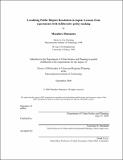| dc.contributor.advisor | Lawrence E. Susskind. | en_US |
| dc.contributor.author | Matsuura, Masahiro, 1974- | en_US |
| dc.contributor.other | Massachusetts Institute of Technology. Dept. of Urban Studies and Planning. | en_US |
| dc.coverage.spatial | a-ja--- | en_US |
| dc.date.accessioned | 2008-03-26T15:49:22Z | |
| dc.date.available | 2008-03-26T15:49:22Z | |
| dc.date.copyright | 2006 | en_US |
| dc.date.issued | 2006 | en_US |
| dc.identifier.uri | http://dspace.mit.edu/handle/1721.1/37604 | en_US |
| dc.identifier.uri | http://hdl.handle.net/1721.1/37604 | |
| dc.description | Thesis (Ph. D.)--Massachusetts Institute of Technology, Dept. of Urban Studies and Planning, 2006. | en_US |
| dc.description | This electronic version was submitted by the student author. The certified thesis is available in the Institute Archives and Special Collections. | en_US |
| dc.description | Includes bibliographical references (p. 423-435) and index. | en_US |
| dc.description.abstract | Can consensus building processes, as practiced in the US, be used to resolve infrastructure disputes in Japan? Since the 1990s, proposals to construct highways, dams, ports and airports, railways, as well as to redevelop neighborhoods, have been opposed by a wide range of stakeholders. In response, there is a growing interest among Japanese practitioners in using consensus building processes, as practiced in the US, in order to resolve infrastructure disputes. Scholars and practitioners in the field of negotiation and dispute resolution, as well as policy transfer theorists, have raised concerns about cross-border transfers by referring to a variety of contextual differences between the "importing" and "exporting" countries. This dissertation investigates the relationship between the context and the introduction of consensus building processes from two perspectives: the adaptation of consensus building processes for the Japanese context and the organizational changes that seem to be required to allow processes from the US to work in Japan. | en_US |
| dc.description.abstract | (cont.) Without process adaptation and organizational change, consensus building processes are unlikely to be helpful in resolving infrastructure disputes in Japan, considering the breadth and depth of the contextual differences -- in organizational, normative, and regulative realms -- between Japan and the United States. The Japanese context for infrastructure planning was investigated through in-depth interviews with 40 practitioners in Japan. In order to explore possible strategies for adaptation and organizational change, I have closely observed an 18-month pilot test of a consensus building process for road intersection improvements in Tokushima, Japan as an instance of adaptation and organizational change. My close observation of this experiment identified a range of creative adaptation. Based on these observations, I argue that process adaptation and organizational change must occur simultaneously when consensus building processes are transferred to a foreign location. | en_US |
| dc.description.statementofresponsibility | by Masahiro Matsuura. | en_US |
| dc.format.extent | 439 p. | en_US |
| dc.language.iso | eng | en_US |
| dc.publisher | Massachusetts Institute of Technology | en_US |
| dc.rights | M.I.T. theses are protected by
copyright. They may be viewed from this source for any purpose, but
reproduction or distribution in any format is prohibited without written
permission. See provided URL for inquiries about permission. | en_US |
| dc.rights.uri | http://dspace.mit.edu/handle/1721.1/37604 | en_US |
| dc.rights.uri | http://dspace.mit.edu/handle/1721.1/7582 | en_US |
| dc.subject | Urban Studies and Planning. | en_US |
| dc.title | Localizing public dispute resolution in Japan : lessons from experiments with deliberative policy-making | en_US |
| dc.type | Thesis | en_US |
| dc.description.degree | Ph.D. | en_US |
| dc.contributor.department | Massachusetts Institute of Technology. Department of Urban Studies and Planning | |
| dc.identifier.oclc | 124507241 | en_US |
